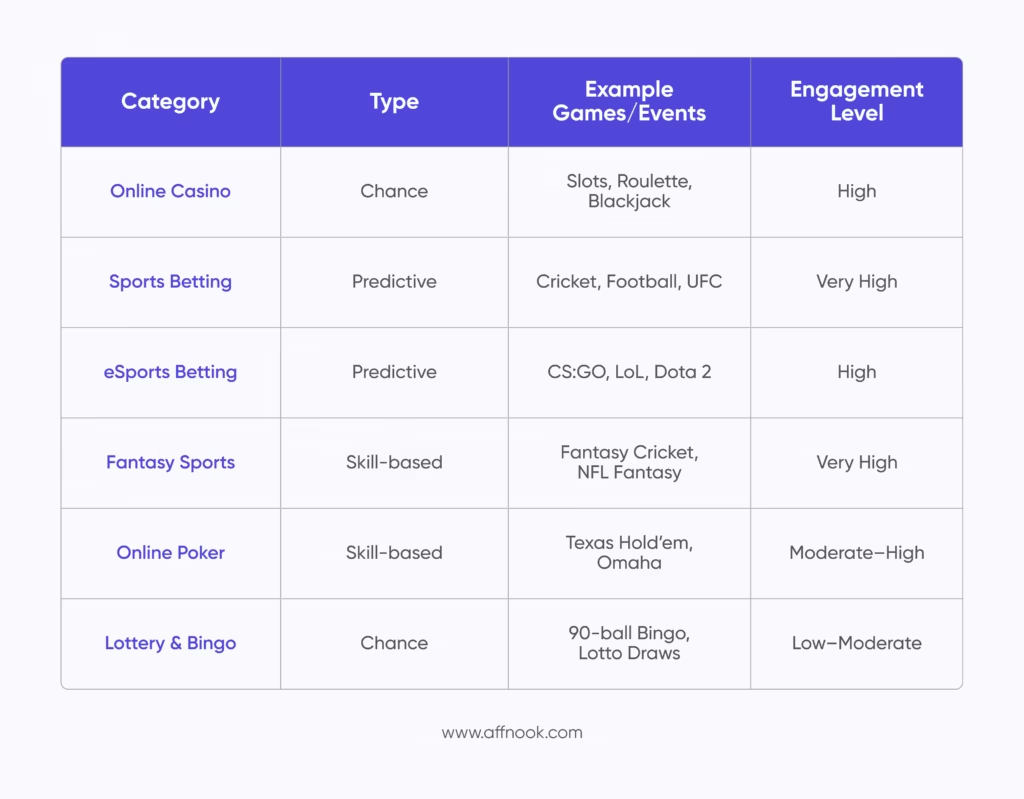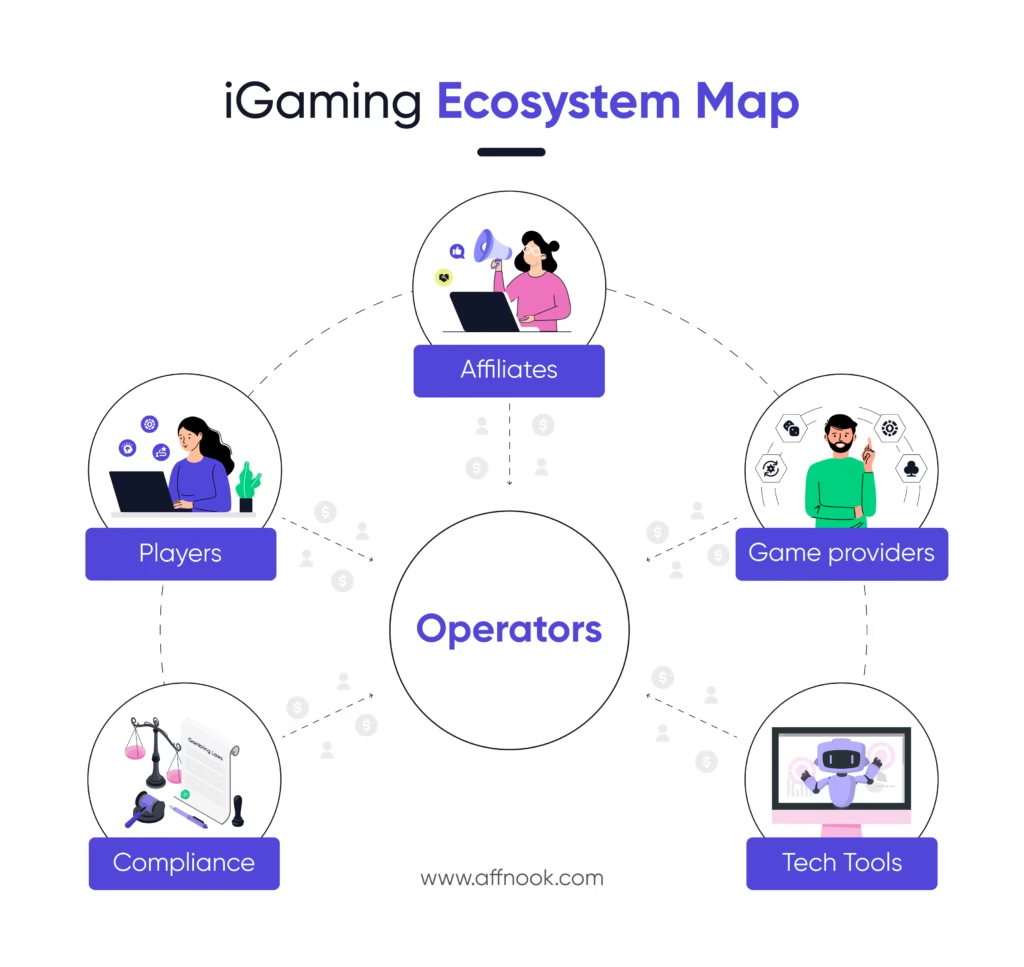Have you noticed how online casinos, betting apps, and fantasy sports platforms seem to be everywhere these days?
That’s because iGaming is one of the fastest-growing digital industries worldwide. But it’s not just about spinning slots or placing bets anymore. Software developers, affiliate marketers, content creators, advertisers, and even influencers are all becoming part of this high-traffic, high-commission ecosystem.
Let’s break down what makes the iGaming such a thriving space and why its many specialized segments (or iGaming niches) present powerful opportunities for professionals across the board.
What is iGaming?
iGaming refers to any form of real-money online gaming. This includes platforms and services that enable:
- Online casinos
- Sports and esports betting
- Fantasy sports leagues
- Online poker
- Lottery, bingo, and skill-based games
While iGaming is a large, regulated, billion-dollar industry, it contains many niche subcategories that appeal to specific user interests and behaviors, such as eSports betting, social casinos, prop betting, and novelty bets.
Why is It Called a Niche?
The term niche is used because this market:
- Its target is the specific audience ( gamblers, sports fans, or VIP bettors)
- It requires unique content and a compliance strategy
- Has its own tools (affiliate tracking software, RNGs, game providers
- Operates under tight regulations depending on geography
For brands and affiliates, online betting platforms attract users who are:
- Highly engaged
- Willing to spend money
- Interested in promotions, odds, and new games
Major Segments of the Online Gambling Industry
The iGaming niche isn’t just one type of game. It includes many forms of online gambling and betting, each made for different kinds of players. From games based on luck to ones that require skill, these categories are what make iGaming exciting and successful.
1. Online Casinos
Online casinos are virtual platforms that transform the experience of traditional casinos. Players can access them via a mobile application or website and play real-money games from anywhere.
Some of the popular games are:
- Slot machines (classic, video slots, jackpots)
- Table games like blackjack, roulette, and baccarat
- Video poker
- Live dealer games, where real hosts stream games in real-time
Why it matters:
It is one of the most profitable categories in the iGaming industry. It is designed for both ordinary users and VIP bettors. It gives a wide range of games, an attractive bonus, and easy access, making online casinos a popular choice for players.
2. Sports Betting
Sports betting allows users to place real money bets on the outcomes of sports events. The user can put wagers before the match or during the live match.
Popular sports include:
- Cricket
- Football
- Tennis
- Basketball
- Horse racing
Types of Bets:
- Match winner
- Over/underscores
- Player performance
- Parlay/multibet options
Why it matters:
Sports betting becomes very popular during the big tournaments. Real-time odds, player stats, and live betting keep users engaged during the match. It is also a great opportunity for affiliates to earn more during these events, like the FIFA World Cup, IPL, or NBA playoffs. making it a key driver of traffic and revenue within the iGaming niche.
3. eSports Betting
In this segment, users are betting on competitive video games known as eSports. These games have professional teams, structured leagues, and millions of fans globally.
Popular games are:
- Call of Duty
- Dota 2
- CS: GO (Counter-Strike: Global Offensive)
- Valorant
Why it matters
Younger people who love tech are big fans of eSports. With sites like Twitch and YouTube Gaming, it’s easy to reach and connect with Gen Z and millennials.
4. Fantasy Sports
Fantasy sports allow users to create their own virtual teams using real-life players. These teams earn points based on how those players perform in actual matches, like scoring goals or runs. The teams with the most points can win real cash prizes.
Popular fantasy sports games are:
- Fantasy cricket
- Fantasy football (both soccer and NFL)
- Fantasy Basketball
Why it matters:
In many places, fantasy sports are seen as games of skill. So the rules and regulations of these games are different from those of regulated gambling. These platforms have become hugely popular in countries like India, the US, and the UK, especially during big leagues like the IPL or NFL.
They also keep users more involved than regular sports betting because players follow their teams closely throughout the match or tournament.
5. Online Poker
Online poker platforms host real-time multiplayer card games where players compete against each other rather than the house. It requires a mix of strategy, psychology, and math.
Popular poker formats:
- Texas Hold’em
- Omaha
- Sit & Go tournaments
- Multi-table tournaments (MTTs)
Why it matters:
Unlike slots or roulette, poker is player vs player (P2P), making it a more competitive and skill-based environment. Many sites offer global tournaments with massive prize pools, loyalty programs, and ranking systems to retain players.
6. Political Betting
Political betting allows users to place real-money bets on the outcomes of political events. These bets can be placed months or even years in advance, depending on the election cycle and global interest.
Examples of political betting markets:
- Who will win the next U.S. Presidential election?
- Which party will form the government in the UK?
- Will a specific candidate drop out before the debate?
- What will the voter turnout percentage be in a given country?
Why it matters:
Political betting draws a highly engaged audience, especially during election seasons. It blends current affairs with prediction, and users often feel they have an edge based on news, polls, or public sentiment. It’s popular in regulated markets like the UK, but restricted or banned in countries like the U.S.
7. Reality TV and Entertainment Betting
This niche involves betting on the outcome of non-sporting entertainment events like reality shows, award ceremonies, or TV competitions, commonly referred to as reality show betting.
Popular betting categories include:
- Who will win Bigg Boss, Survivor, or The Bachelor?
- Which film will win Best Picture at the Oscars?
- Will a specific celebrity perform at the Super Bowl halftime show?
- Who will be eliminated next in a talent show like The Voice or India’s Got Talent?
Why it matters:
Reality show betting appeals to casual gamblers who may not follow sports but are deeply engaged with pop culture. Interest spikes during major televised events, making it a great traffic source for affiliates via blogs, YouTube reviews, influencer commentary, and social media polls.

Who Are the Players in the Niche?
The iGaming niche is more than just players logging in to spin slots or place bets. It’s a full ecosystem made up of different people and businesses, each playing a unique role in keeping everything running smoothly.
Here’s a breakdown of the key participants:
Operators
These are the companies that run the actual gambling platforms, like online casinos, sportsbooks, or poker rooms.
Example: Bet365, Stake, 1xBet
They’re responsible for handling payments, offering games, managing users, and making sure everything follows legal rules.
Game Providers
These are the tech companies that build the games you see on casino and betting sites, like slot machines, roulette, or live dealer games.
Example: Evolution, Pragmatic Play, Playtech
Operators buy or license these games to offer them on their platforms.
Affiliates
Affiliates are marketers or content creators who promote iGaming platforms and send them new users. They earn money through commissions, either one-time (CPA) or ongoing (revenue share)
Example: Casino review blogs, YouTube tip channels, Telegram betting groups
Affiliate Platforms & Tracking Tools
These platforms help operators and affiliates work together. They track clicks, signups, and revenue, and ensure everything is fair and transparent.
Example: Affnook
They also help manage payouts, campaigns, and compliance.
Regulators & Licensing Bodies
These are government or independent organizations that make sure iGaming platforms follow the law. They issue licenses, monitor activity, and protect users.
Example: UK Gambling Commission, Malta Gaming Authority, Curacao eGaming
Players
These are the end users, the people who play the games, place bets, and drive the industry. Some play casually, while others are more serious and play often. They’re the reason the rest of the system exists.

Why the iGaming Niche Attracts Marketers and Affiliates
Online gambling isn’t just popular with players; it’s also a goldmine for marketers and affiliates. Here’s why so many professionals are choosing this space to grow their income and build long-term businesses.
- High Payouts
Affiliates can earn big commissions for each player they bring in. Some programs pay between $100 to $500 per signup (CPA), while others offer a revenue share model, where affiliates earn a percentage of the player’s lifetime spending.
- Recurring Income
With revenue-sharing deals, affiliates don’t just get paid once; they can earn month after month, as long as the player stays active. This makes it a great source of passive income.
- Global Audience Reach
From Europe to Asia to North America, people everywhere play online casino games or bet on sports. This gives marketers and affiliates the chance to target multiple countries and niche audiences, using local content and offers.
- Strong Search Demand
Search terms like best casino bonuses, cricket betting apps, cricket betting website, and how to win at slots have high search volumes and conversion potential. Affiliates can use blogs, SEO, YouTube, and social media to attract traffic and send players to trusted platforms.
5. Creative Freedom
There’s no one-size-fits-all approach. Affiliates and marketers can use:
- Review websites
- Bonus comparison pages
- Telegram or WhatsApp groups
- Email newsletters
- Social media or influencer content
This allows you to pick the strategy that fits your audience and skills best.
Conclusion
The iGaming niche has grown far beyond just online casinos or sports betting. With new segments like esports, fantasy leagues, reality show betting, and even political wagering, there are now more ways than ever to get involved.
Whether you’re a content creator, affiliate marketer, developer, or entrepreneur, the best way to enter this space is by starting small. Choose one segment to focus on, and pick a region where you can learn the local rules and user behavior.
Once you’re set, use trusted affiliate tools like Affnook to track your campaigns, manage performance, and stay organized. Above all, make sure you follow regulations and build trust with your audience. The iGaming niche is full of potential, and with a smart, consistent, and honest approach, you can turn it into a reliable and long-term business opportunity.
Help Section
1. What is the iGaming niche, and how do different segments within it generate revenue?
The iGaming niche refers to various verticals within the online gambling industry, such as sports betting, online casinos, poker, fantasy sports, lotteries, and esports betting. Each segment has its own monetization model. Sportsbooks rely on betting margins, casinos use game RTP and player lifetime value (LTV), while affiliates earn commissions through CPA or RevShare. Understanding how these segments work helps operators and marketers identify the most profitable opportunities in specific geographies or target audiences.
2. Which iGaming niche is the most popular among global bettors in 2025?
As of 2025, sports betting remains the most popular iGaming niche globally, driven by major events like the FIFA World Cup, ICC Cricket World Cup, and the Olympics. However, online casinos are rapidly growing in markets like Canada, the UK, and parts of Europe due to mobile accessibility and a wide variety of slots and table games. Esports betting is emerging as a top choice among Gen Z audiences, especially in regions like Southeast Asia and Eastern Europe.
3. How do iGaming operators choose which niche to enter in a new market?
Operators evaluate several factors before entering a specific iGaming niche in a new market:
- Legal regulations (e.g., whether sports betting or casinos are allowed)
- Audience behavior and betting trends
- Local competition and market saturation
- Revenue potential per user (ARPU)
- Marketing and acquisition costs
For example, in the US, sportsbooks dominate due to favorable state regulations, while in India, fantasy sports and rummy see higher adoption due to legal gray zones.
4. What are the best-performing iGaming niches for affiliate marketers?
Affiliate marketers often find the most success in niches that offer:
- High lifetime value (LTV)
- Recurring commission models
- Low competition but high search intent
Top-performing iGaming niches for affiliates in 2025 include:
- Online casinos with popular slot games
- Live sports betting during international events
- Fantasy sports in India and the US
- Crypto-based gambling platforms, which are gaining traction among blockchain-savvy users
Affiliates should align their content and traffic strategy with the niche’s geography and regulation status for optimal ROI.
5. How does geo-targeting impact success in different iGaming niches?
Geo-targeting is crucial in iGaming because laws, betting behavior, and preferences vary by region. For instance:
- In Germany, online slots are legal but heavily regulated.
- In the UK, all major iGaming niches are regulated but require strict ad compliance.
In India, fantasy sports are legal in many states, but casino games are often banned.
Geo-targeting allows operators and marketers to serve the right niche content and promotions to audiences based on their local laws and betting preferences, boosting engagement and compliance.




